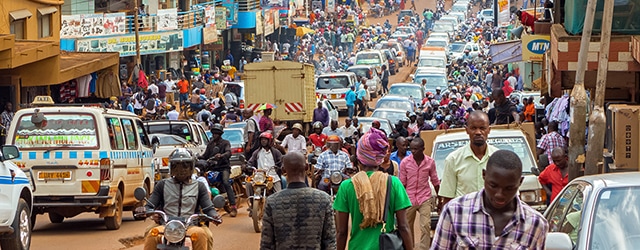Uganda’s success is tied to stable government, but some key economic features are lacking.

|
UGANDA: VITAL STATISTICS |
|---|
|
Location: East Africa |
|
Neighbors: South Sudan, Kenya, Tanzania, Rwanda, Democratic Republic of the Congo |
|
Capital city: Kampala |
|
Population (2018): 44,883,826 |
|
Official language: English and Swahili |
|
GDP per capita (2017): US$604 |
|
GDP growth (2017): 4.0% |
|
Inflation (2017): 5.2% |
|
Currency: Shilling, sometimes referred to as the second shilling—as distinct from the first shilling, which it replaced in 1987 |
|
Investment promotion agency: Uganda Investment Authority |
|
Investment incentives available? Various tax incentives, depending on sector |
|
Ease of Doing Business rank (2019): 127 |
|
Corruption Perceptions Index rank (2017): 151 |
|
Political risks: Terrorism, protests |
|
Security risks: Increasingly common boat accidents; random violence; refugees from South Sudan |
|
PROS |
|---|
|
A strong partner with the US in combatting terrorism |
|
Untapped resources |
|
CONS |
|---|
|
Violence and crime |
|
Sources: Al-Jazeera; Bloomberg; CIA World Factbook; Deloitte; International Monetary Fund; PwC; Reuters; Stratfor; Transparency International; US State Department; US, UK and Canadian governments, foreign travel advisories; World Bank |
|
For more information, check out Global Finance‘s Uganda Economic Report data page. |
Uganda has a reputation for stability, due in no small part to the apparently lifetime rule of President Yoweri Museveni, who came to power in 1986 after decades of strife both within the country and with its neighbors. Yet it is the government that is stable, not the broader political landscape. What’s more, Uganda lacks a clear succession plan and could fall back if Museveni were to leave office.
“We have the appearance of political stability,” says Mwambustya Ndebesa, a lecturer in history and political science at Makerere University. “But there is underlying political instability.”
Political intrigues, arrests and assassinations, as well as protests and violence, threaten the regime. The US State Department in its 2017 Human Rights Report, notes that “security forces often arbitrarily arrested and detained persons, including opposition leaders, politicians, activists, demonstrators, and journalists.” A UK advisory warns against traveling outside major towns at night. Some of the violence is protest against unemployment, allocation of government jobs and land.
Still, the economic landscape has numerous supports and advantages. Last May, the World Bank reinstated new lending after improvements in project implementation and safeguards. Uganda offers access to some 222 million potential customers in the East African Community trade zone. It has plentiful resources, including copper, gold, nickel, platinum and oil, and its mineral resources, according to mining industry specialist AZoMining, remain largely untapped, and “not a significant contributor to its economy.”
But the country offers more than metals. “The economy of Uganda is driven by services,” explains Corti Paul Lakuma, economist and research fellow at Uganda’s Economic Policy Research Centre. The sector includes financial services, such as banking, insurance and accounting, as well as tourism, health care and accounting. Industry, including manufacturing, contributes 55% of GDP, Lakuma says.
Agriculture and tourism are bright spots, with increases expected in coffee shipments and tourism, the latter spurred by good weather and the so-called Kanye effect—publicity from the pop star’s 2018 visit with his wife, Kim Kardashian.
Uganda has a liberal attitude toward foreign direct investment (FDI), with few restrictions. Priorities are agriculture and agribusiness, information and communications technology, tourism, packaging and mineral processing. It also offers opportunities in oil and gas, renewable energy, manufacturing, services and infrastructure.
The government has ordered aircraft from both Bombardier and Airbus in its desire to build—re-build—a strong national airline. “That’s one tool other countries, particularly Rwanda and Kenya, have used effectively to brand the country,” Lakuma says. A previous effort, Uganda Airlines, failed in 2001. Yet such airlines often do not make a profit. Rwanda’s RwandAir lost over $222 million between 2013 and 2016, according to local estimates.
Uganda features stark economic disparities. While agriculture employs roughly 80% of Ugandan workers, it accounts for only about 20% of GDP, Lakuma says. “Urbanization is proceeding at a very slow rate, because the service sector can barely accommodate it,” Lakuma explains. “[The service sector] is hugely productive; but it employs a lot of technology, which is capital intensive. It doesn’t need a lot of labor.”
Meanwhile, neighbors are outgunning Uganda in courting FDI. Rwanda and Kenya have cheaper electricity, simplified registration requirements, better transportation and lower levels of corruption. Compounding its economic problems, Lakuma notes, the informal economy accounts for between 45% and 50% of the total GDP, depriving Uganda’s government of tax revenues.



